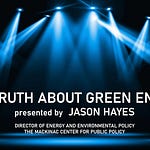After completing my presentation at the Free Market Road Show at Northwood University in April last year, I had the opportunity to sit down with Barbara Kolm from the Austrian Economics Center. As part of her work at the AEC, Barbara hosts the Free Market Road Show Podcast. She just posted our interview to YouTube.
I was invited to speak on a panel at the Free Market Rodad Show to examine how America and Europe can best address their environmental challenges. I joined Nick Loris, vice president of public policy at C3 Solutions. Northwood live-streamed our presentations.
After the presentation, Barbara and I started the interview by discussing humanity’s role in nature, something I’ve spent three decades working on — as a backcountry ranger and forester in British Columbia, in the energy industry, and now with the Mackinac Center.
After the intro, Barbara (who is also a hunter) wondered how hunting license funds in North America support wildlife management. I explained that hunters aren’t just conserving nature; we’re balancing ecosystems.
Next, we debunked the pervasive and inaccurate notion that humans are inherently destructive by focusing on the fact that humans are a part of the natural world. Using resources — hunting, forestry, mining, etc. — is not necessarily destructive; humans need to use resources to live flourishing lives. The COVID lockdowns exposed an anti-human streak in some circles, with groups claiming humans are a virus. That’s not just wrong; it’s suicidal thinking.
Barbara then brought up Paul Ehrlich’s The Population Bomb and its string of failed predictions. Despite his apocalyptic warnings in the ’60s — and his continued insistence that he was insufficiently apocalyptic, he believes things are even worse today — the Green Revolution proved him completely wrong.
We tackled the bad science that drives climate fears and how birth rates are dropping globally — below the 2.1 kids per couple needed to sustain populations. Instead of fear-mongering, we should encourage families and use technology to solve environmental challenges. I retold the information in my slides where I asked people to imagine the entire human population of the world — all 8 billion people — standing shoulder to shoulder in rank file. That crowd could all fit within the boundaries of New York City, leaving the planet empty. That provides listeners with some perspective to help them understand just how misguided are the notions that we’re clogging the planet and its ecosystems with hordes of people.
Regarding energy, I explained that I am skeptical of wind and solar. They’re intermittent and unreliable. They require backup systems like natural gas because they can go to zero (or near zero) at any moment. But that unreliability means you must build a second system to provide for all of the electricity demand at any time. So, you effectively end up building two systems, one wind/solar-based grid and another reliable grid to pick up when and where wind and solar inevitably fail.
Worse, wind turbines kill millions of birds, bats, and insects; the DOJ even charged ESI Energy, LLC for killing 150 gold and bald eagles at its wind facilities across the U.S. Subsidizing, mandating, and promoting that kind of environmental harm is a bad idea. Instead, I advocate for free-market solutions: let customers demand cleaner, reliable options like gas or nuclear.
Education matters, too. Rather than being tied to a phone or computer or gaming system all day, kids need to get out in nature — touching leaves, hiking, skiing, biking, or catching fish and hunting.
And what is intelligent climate policy? Less regulation, more market-driven innovation. That’s the path forward.













Share this post